Political Commentary - Public: Government Should Intervene On Climate Change … Just Don't Tax Us
In the wake of the recent flooding that has inundated vast swathes of the country the debate about climate change continues to gather pace.
In particular, the role of government and its response to climate change is increasingly under scrutiny. Here, words and statements of intent are as ubiquitous as the rising water -- each of the main political parties has repeatedly acknowledged the need for action to both mitigate and adapt to the threat of climate change. However, the focus is turning towards delivery and, as it does, two questions are critical. What do the public think Government should do? And, in view of the long and lingering shadow that the fuel protests of 2000 have cast over eco taxation, what level and kinds of intervention are they willing to accept?
Our report Tipping Point or Turning Point, Social Marketing & Climate Change finds a complex pattern. First, there is no lack of support for government intervention in principle. A strong majority (66%) believe that the UK can make a real difference in stopping climate change, and the British public, more so than their European counterparts, strongly support action at the national level in preference to supra national organisations like the EU.
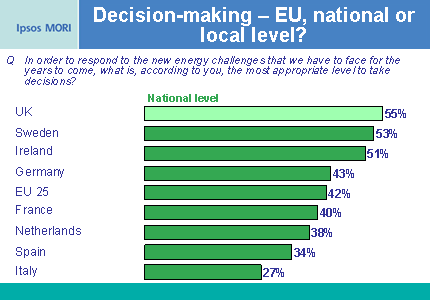
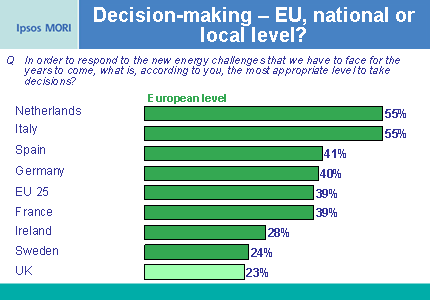
The call for a collective response lies in the public's demand for assurances that their individual actions will be matched by others: over half (54%), fearful of making personal sacrifices that would quickly be negated by 'free riders', say they would take more steps on climate change if others did too. Fairness and equity are clearly key.
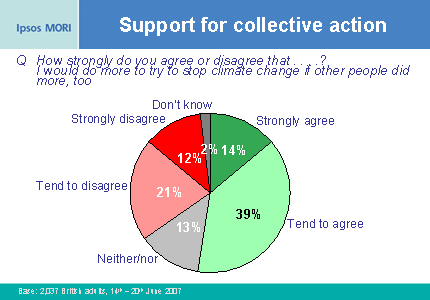
All of this equates to a clear and strong statement of intent among the public: 70% agree the Government should take the lead in combating climate change, even if it means using the law to change people's behaviour.
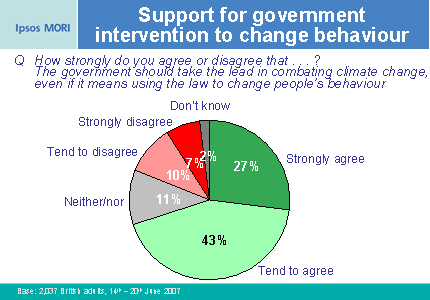
While the level of support in principle for government action is indeed encouraging, when it comes to specific interventions the public's reaction becomes more complex and, with it, the line the Government must tread more perilous.
On some issues the potential for negative reactions is low. It is clear, for example, that the public's latent desire for government orchestrated action feeds through into support for, among other things, banning incandescent light bulbs and setting minimum energy and water efficiency standards for new appliances. Such measures are considered 'no brainers' and the public are even slightly baffled as to why unsustainable choices are not simply removed from sale (suggesting there is considerable mileage in what Ed Mayo and the Sustainable Consumption Roundtable have coined "choice editing").
However, the same cannot be said to be true of interventions that involve fiscal levers or seek to address some of the core features of our lifestyles -- charges on personal mobility a case in point. Here, only 21% are willing to actively support a policy aimed at increasing the cost of flying, and fewer still (14%)the cost of motoring.
Two key factors explain the public's antipathy around green taxation. A general sentiment that motorists and travellers already "pay enough" is underscored by suspicion and cynicism that green taxation has more to do with revenue raising than saving the planet. The principle of hypothecation is appealing but the stigma of "stealth taxation" looms large and it is unclear how the public can be assured that monies raised are genuinely earmarked for environmental protection. Measures to foster public trust and confidence in climate change policy should therefore feature highly on the government's "to do" list.
Set within this context caution is perhaps a natural political instinct, particularly when dealing with environmental problems spanning many decades while the electoral cycle is considerably shorter. Nonetheless, the tendency for caution may not always be well founded. The London Congestion Charge, for example, provides a telling example where strong initial opposition was effectively won over by the successful introduction of the policy.
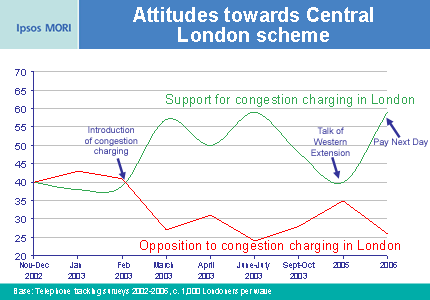 Moreover, according to the scientists caution is not an option in the face of a rapidly closing climatic window of opportunity to cut carbon emissions and avert dangerous increases in global temperatures. In view of this, will this government and those of the future follow London's lead and bank on fortune favouring the brave? Eco taxation is indeed a thorny and difficult issue, but one we have to address.
by Phil Downing
Moreover, according to the scientists caution is not an option in the face of a rapidly closing climatic window of opportunity to cut carbon emissions and avert dangerous increases in global temperatures. In view of this, will this government and those of the future follow London's lead and bank on fortune favouring the brave? Eco taxation is indeed a thorny and difficult issue, but one we have to address.
by Phil Downing


